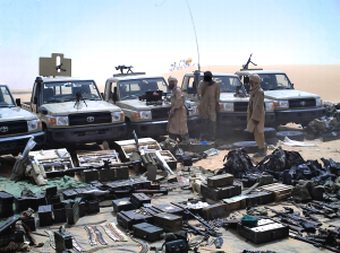 Intelligence services which monitor the evolution of the situation in northern Mali reported that more than sixty elements from the camps of Tindouf, stronghold of the Polisario Front in Algeria, have recently arrived in Timbuktu and Gao.
Intelligence services which monitor the evolution of the situation in northern Mali reported that more than sixty elements from the camps of Tindouf, stronghold of the Polisario Front in Algeria, have recently arrived in Timbuktu and Gao.
These Polisario members are not the first to come to the rescue of jihadist groups in northern Mali. Last September and October, several reports had signalled the presence of dozens of armed elements come from the Polisario-controlled Tindouf camps.
The newcomers receive luring bonuses, as the hard currency reserves of AQIM and Mujao emirs have been restocked by the ransoms obtained in exchange of the release of Western hostages.
The latest of these foul extortions dates back to July 2012, when the three Western aid workers who had been kidnapped in October 2011 in the Tindouf camps were released.
The hostages were freed after the payment of a 15 million euro ransom to Mujao, which had initially demanded the double of this amount. These developments support reports underscoring the Polisario’s involvement in large networks of drug, weapons and ammunition trafficking with jihadist groups present in the Sahel.
The recent interception in Algeria of a load of rockets and anti-aircraft missiles from Libya, which was intended for AQIM and Mujao groups in northern Mali, is a strong indicator of these complex connections.
According to experts, a scrutiny and cross examination of these data provide, at least in part, an explanation for Algiers’ fierce opposition to an ECOWAS military intervention to liberate northern Mali.
This stubborn resistance to any foreign intervention in the region which seemed incomprehensible at first glance, certainly betrays the fear of the Algerian DRS (military intelligence services) to see the secret interventions they conducted over the last twenty years at the Algerian borders with Mali and Niger finally unmasked.
